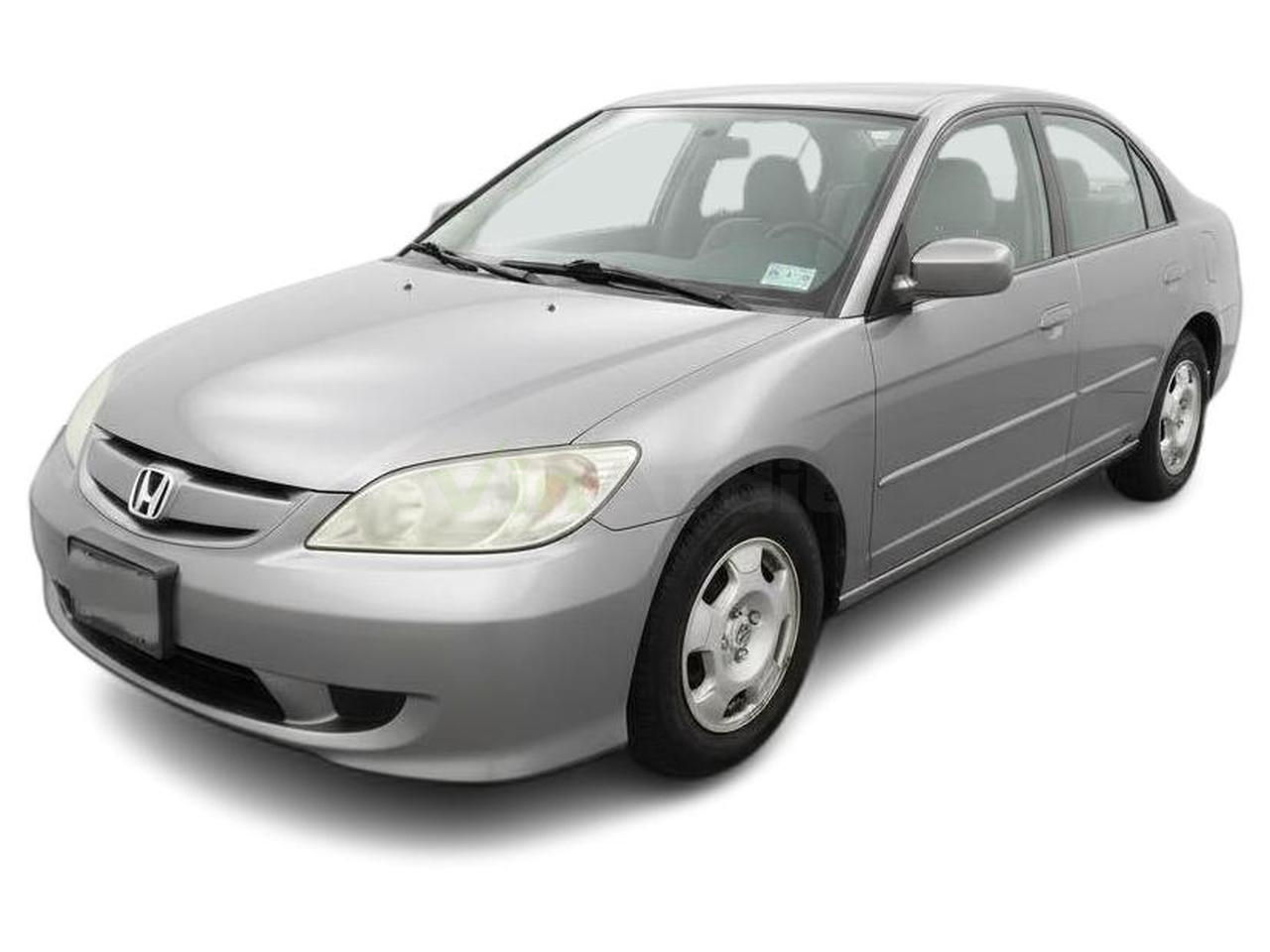The Good
Its primary advantage is outstanding fuel efficiency, making it highly economical for daily commutes. Practical buyers appreciate Honda's reputation for reliability (outside of the hybrid battery), low running costs, and decent comfort. Emotionally, it offered drivers the satisfaction of owning cutting-edge eco-friendly technology and a reduced carbon footprint, providing great value for its fuel savings.
The Bad
The most significant weakness is the degradation or failure of the Integrated Motor Assist (IMA) battery pack, leading to reduced fuel economy and diminished performance. Other concerns include potential issues with the IMA control module and occasional catalytic converter problems. Its performance can also feel sluggish compared to conventional gasoline Civics.
2005 Honda Civic Hybrid: Quick Overview
- Engine: The 2005 Honda Civic Hybrid is powered by a 1.3-liter SOHC i-VTEC 4-cylinder gasoline engine paired with Honda's Integrated Motor Assist (IMA) electric motor system. This parallel hybrid system provides electric motor assist during acceleration and regenerative braking.
- Horsepower: The combined output of the gasoline engine and electric motor is approximately 93 horsepower at 5700 rpm and 116 lb-ft of torque at 1500 rpm.
- Fuel Economy: This vehicle boasts impressive fuel economy for its time. EPA estimates were around 47 MPG city / 48 MPG highway for a combined 47 MPG. Real-world figures could vary, but it consistently delivered excellent mileage.
- 0-60 Times: Due to its focus on efficiency rather than outright performance, the 0-60 mph acceleration time was relatively modest, typically ranging between 11 to 12 seconds.
- Towing Capacity: The 2005 Honda Civic Hybrid is generally not rated or recommended for towing. Its hybrid powertrain and compact structure are not designed for such loads.
- Trim-Level Features: The Civic Hybrid was offered largely as a single, well-equipped trim level. Standard features included:
• Continuously Variable Transmission (CVT)
• Automatic climate control
• Power windows and door locks
• Power mirrors
• Cruise control
• AM/FM/CD stereo with 4 speakers
• Tilt steering column
• Driver's seat height adjustment
• Remote keyless entry
• 14-inch lightweight alloy wheels
• ABS brakes
Optional features were limited, mostly to dealer-installed accessories like an upgraded sound system or protective items.
2005 Honda Civic Hybrid Specifications
Vehicle Information
| Year | 2005 |
| Make | Honda |
| Model | Civic |
| Trim | - |
| Style | Sedan |
| Type | Sedan |
| Category | Compact Car |
Manufacturing Details
| Made In | Japan |
| Manufacturing City | SUZUKA |
Dimensions
| Doors | 4-Door |
| Curb Weight | 2675 pounds |
| Gross Vehicle Weight Rating | 4000 pounds |
| Overall Height | 56.30 inches |
| Overall Length | 175.40 inches |
| Overall Width | 67.50 inches |
| Wheelbase Length | 103.10 inches |
| Standard Seating | 5 |
Engine & Performance
| Engine | 1.3L I4 |
| Engine Size | 1.3L |
| Engine Cylinders | 4 |
| Transmission | Automatic |
| Transmission Type | Automatic |
| Transmission Speeds | 5-Speed |
| Drivetrain | Front-Wheel Drive |
Additional Features
| Anti-Brake System | 4-Wheel ABS |
| Steering Type | Rack & Pinion |
Pricing
| Manufacturer Suggested Retail Price (MSRP) | $20,050 |
| Invoice Price | $18,320 |
| Delivery Charges | $515 |
Vehicle History Report
Specifications
History
Events
History Check
Check
Check
Check
Check
Listings
Recalls
Check
Analysis
What Problems Does the 2005 Honda Civic Hybrid Have?
Another common issue, often related to the battery, is the failure of the IMA control module, which manages the hybrid system. This can lead to similar symptoms of diminished hybrid performance. Some owners also reported problems with the vehicle's 12-volt battery being drained, sometimes linked to issues with the IMA system not properly charging it. Furthermore, catalytic converter failures have been reported, which can sometimes be a secondary effect of the engine running rich due to IMA system malfunctions.
Less common but still noted issues include ABS modulator failures, which can be expensive to repair. Regarding recalls, while there weren't widespread recalls specifically for the IMA battery pack in the same manner as some other components, Honda did issue service bulletins and provided extended warranty coverage for many of these battery failures due to high complaint rates. Owners should research specific VIN-related recalls for any potential safety or component issues, but the IMA system remains the predominant long-term reliability concern for all 7th-generation Civic Hybrid model years (2003-2005).
How long will the 2005 Honda Civic Hybrid last?
What Technology & Safety Features are Included?
In terms of safety, the 2005 Civic Hybrid came standard with dual-stage, dual-threshold front airbags for the driver and front passenger. Four-wheel anti-lock brakes (ABS) were standard, with front disc brakes and rear drum brakes providing decent stopping power. While not standard, front side airbags were an available optional safety feature, offering enhanced protection in side-impact collisions. The vehicle's body structure was designed with Honda's G-CON (G-Force Control) technology to help manage crash energy.
Crash-test ratings for the 2005 Honda Civic Hybrid generally reflected its strong safety performance for the time. The National Highway Traffic Safety Administration (NHTSA) awarded the Civic Sedan (which shares the Hybrid's structure) 5 stars for frontal driver and passenger crash protection and 4 stars for front and rear side-impact protection (when equipped with side airbags). The Insurance Institute for Highway Safety (IIHS) gave the 2005 Civic a "Good" rating for its frontal offset crash test, which was the highest possible rating, and an "Acceptable" rating for side-impact protection when equipped with optional side airbags. Without side airbags, the side impact rating was "Poor."
What Colors Options are Available?
2005 Honda Civic Hybrid Prices and Market Value
2005 Honda Civic Hybrid Cost of Ownership
2005 Honda Civic Hybrid Fuel Efficiency
2005 Honda Civic Hybrid Safety Rating
NHTSA
IIHS
2005 Honda Civic Hybrid Warranty
Basic
Powertrain
Rust
2005 Honda Civic Hybrid Insurance
reasonable repair costs.
How Does the 2005 Honda Civic Hybrid Compare to Other Sedan?
In terms of performance, the Civic Hybrid was adequate but not spirited. Its 93 combined horsepower was less than a standard Civic and comparable to the Prius (which had 110 hp). The CVT transmission prioritized efficiency over acceleration. The Prius often felt slightly more refined in its hybrid operation.
Regarding features, both the Civic Hybrid and Prius offered similar levels of standard equipment for their compact class, including automatic climate control and power accessories. The Prius, however, often boasted a slightly more advanced interior design with a central display and, in some trims, a navigation system, making it feel a bit more technologically forward. The Civic Hybrid stuck closer to traditional Civic interior aesthetics.
Reliability is where a significant distinction emerges. While general Honda reliability for conventional components (engine, transmission) is excellent, the 2005 Civic Hybrid suffered from widespread issues with its Integrated Motor Assist (IMA) battery pack. These batteries often degraded or failed, leading to costly replacements and reduced efficiency. In contrast, the Toyota Prius of the same era (XW10 and early XW20 generations) generally demonstrated superior long-term reliability of its hybrid battery system, making it a more dependable hybrid option over time.
In terms of price, when new, both were competitively priced in the $20,000-$23,000 range. However, on the used market today, the Civic Hybrid often fetches significantly lower prices than a comparable Prius due to the known battery issues and the associated risk.
Recommended alternatives: For a more reliable hybrid experience, the Toyota Prius (especially 2004-2009 models) is often considered superior due to its more robust Hybrid Synergy Drive system. If fuel economy isn't the absolute top priority and pure long-term mechanical reliability without hybrid complexities is desired, a conventional Honda Civic or Toyota Corolla from the same era would be excellent, incredibly durable choices with lower potential repair costs for specialty components.
Final Verdict: Is the 2005 Honda Civic Hybrid a Good Sedan?
Is it worth buying today? Yes, but with significant caveats. It is definitely worth considering as a used vehicle, but only under specific conditions. Prospective buyers must prioritize a thorough inspection of the Integrated Motor Assist (IMA) battery pack. An ideal purchase would be an example where the IMA battery has been recently replaced with a new or reconditioned unit, documented with receipts. If the battery is original and showing signs of degradation (e.g., "check engine" light, poor assist), the purchase price should be low enough to comfortably factor in the cost of a replacement. As there aren't distinct trims, focus on overall condition and maintenance history. For those willing to manage potential hybrid system quirks, it can serve as a very economical and reliable daily driver for years to come.

